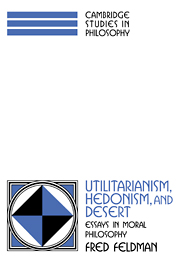5 - Two questions about pleasure
Published online by Cambridge University Press: 05 June 2012
Summary
INTRODUCTORY COMMENTS
World utilitarianism, as presented in the papers in Part I of this book, is a view in normative ethics. It purports to tell us how we ought to behave. According to that view, at each moment, a person ought to bring about the states of affairs that occur in the best worlds then accessible to him or her. This is my reformulation of what I take to be the core insight of consequentialism. It is my interpretation of the idea that our moral obligation is always to do the best we can – to make the world as good as we can make it.
As stated, the theory is pretty abstract. It purports to tell us something of the structure of the concept of moral obligation, and it purports to tell us something about the connection between normative concepts (moral rightness, wrongness, and obligatoriness) and axiological concepts (good and evil). But it does not tell us what makes one world better than another.
There are many different axiological theories. These include simple hedonism, qualified hedonism, eudaimonism, pluralism, and many others. They generate different rankings of worlds. World utilitarianism might be linked to any of these axiologies – and, of course, we will get different normative results if we link it to one of them rather than to another.
Because hedonism is one of the oldest, most plausible, and simplest of axiological theories, it is reasonable to take it as our starting point.
- Type
- Chapter
- Information
- Utilitarianism, Hedonism, and DesertEssays in Moral Philosophy, pp. 79 - 105Publisher: Cambridge University PressPrint publication year: 1997

